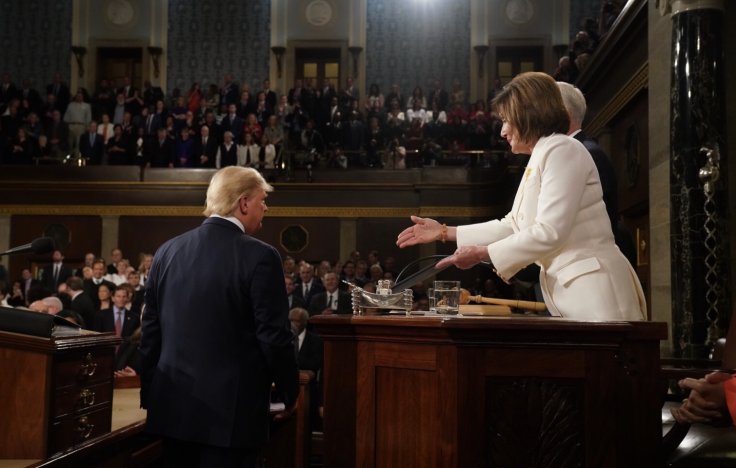Among the theatrics that accompanied President Donald Trump's State of the Union address on Tuesday, the most piquant moment was when he declined to shake hands with House speaker Nancy Pelosi. In an obvious snub, Trump didn't reciprocate the hand-shake offered by the speaker before he was received on the dais.
On her part, Pelosi returned the compliment at the end of Trump's address by tearing away the copies of the speech. Tensions between the President and House Speaker have risen considerably after the House of Representatives impeached Trump in December last month.

Even as Trump was handing out copies of his speech to Pelosi and Vice President Mike Pence, the Speaker extended her hand to the president. However, Trump turned to face the House abruptly leaving Pelosi stunned. It is not known if the incident was deliberate or not. Trump did not shake Vice President Mike Pence's hand either, though he did not appear to extend his to greet the president.
The moment immediately went viral on social media. "Democrats will never stop extending the hand of friendship to get the job done for the people", Pelosi tweeted, responding to the handshake incident. "We will work to find common ground where we can, but will stand our ground where we cannot", she added.

Pelosi tore Trump's speech
On her part, immediately after Trump was done with his speech, House Speaker Pelosi ripped off her copy of the speech. When asked by reporters, why she ripped the speech off, "because it was a manifesto of mistruths," she replied. She also said, "It was the courteous thing to do, considering the alternatives".
Pelosi's style of applause went viral
There is nothing new in snubs between Trump and Pelosi. Last year, after his speech at the State of the Union, Pelosi's style of applause had gone viral. The State of the Union Address (SOTU) is an annual message delivered by the President, before a joint session of the Congress at the beginning of each calendar year in office. In his address, the President talks on issues, such as, economic situation, national security and legislative priorities.
Read more









